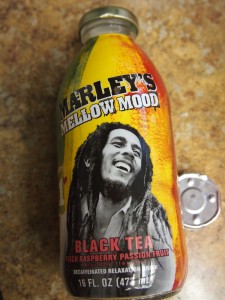Lilly found a bottle of Marley’s Mellow Mood Black Tea “decaffeinated relaxation drink” the other day at one of the grocery stores we visit sometimes. Marley as in Bob Marley. And what’s the secret relaxation ingredient? Something still banned in 48 states?
 Of course not. Besides tea, the ingredients include “pure cane sugar, critic acid, natural flavor, sodium citrate, chamomile extract, lemon balm extract, valerian root extract, hops extract, and passionflower extract.”
Of course not. Besides tea, the ingredients include “pure cane sugar, critic acid, natural flavor, sodium citrate, chamomile extract, lemon balm extract, valerian root extract, hops extract, and passionflower extract.”
I had to look up valerian root. This from the University of Maryland Medical Center: “Valerian has been used to ease insomnia, anxiety, and nervous restlessness since the second century A.D. It became popular in Europe in the 17th century. It has also been suggested to treat stomach cramps. Some research — though not all — does suggest that valerian may help some people with insomnia. Germany’s Commission E approved valerian as an effective mild sedative and the United States Food and Drug Administration listed valerian as ‘Generally Recognized As Safe.’
“Scientists aren’t sure how valerian works, but they believe it increases the amount of a chemical called gamma aminobutyric acid (GABA) in the brain. GABA helps regulate nerve cells and has a calming effect on anxiety. Drugs such as alprazolam (Xanax) and diazepam (Valium) also work by increasing the amount of GABA in the brain. Researchers think valerian may have a similar, but weaker effect.”
Later in the article, the UMMC says that “Valerian root has a sharp odor. It is often combined with other calming herbs, including passionflower (Passiflora incarnata), hops (Humulus lupulus), lemon balm (Melissa officinalis), skullcap (Scutellaria lateriflora), and kava (Piper methysticum) to mask the scent. Kava, however, has been associated with liver damage, so avoid it.”
Except for skullcap and kava, that’s practically the same list of ingredients as Marley’s Mellow Mood. Lilly drank most of it, but didn’t seem noticeably calmer, though she’s usually pretty calm. She springs from phlegmatic people, and comes to the feeling naturally, I think.
I had a little of the tea myself. Not bad. I didn’t feel particularly mellow afterward, either. No more than usual, anyway.
The bottle also tells me, “Manufactured in the USA for Marley Beverage Company LLC, Southfield, MI.” Suburban Detroit isn’t particularly associated with Marley (or Rasta) that I know of, but I don’t really know that much about him. Pretty much by chance, however, I did see Bob Marley in concert. Until today I couldn’t remember exactly when I saw him at Vanderbilt, just that it was freshman year at the not-too-acoustically-good Memorial Gymnasium, where nevertheless the big or biggish acts played (it was the biggest hall on campus).
Remarkably, I’m able to look it up. The concert was on December 10, 1979. I don’t remember it like it was yesterday. I remember it like it was well over 30 years ago. I would have recognized “I Shot the Sheriff,” “No Woman, No Cry,” and “Get Up, Stand Up” on the playlist, but not much else. I wasn’t much of a fan. A girl I knew had persuaded me to go.
I also remember that the auditorium was smoky – smoking of one kind was allowed during concerts in those days, and smoking of another kind was tolerated – and that between songs Marley would cry out, “All hail Jah!” “Almighty Jah!” and the like, as well as “Free Zimbabwe!”
At that moment in history, post-Rhodesia Zimbabwe was transitioning toward independence, which would be formally achieved in April 1980. Marley was there to play for the independence celebrations, and the description’s worth reading: “During ‘I Shot The Sheriff’ riots have led [sic] to pause the concert. Marley later reappeared on stage to perform three more songs before the concert was definitely cancelled. A free concert was performed one day later…”
The VU audience was a bit more sedate than that, even without the benefit of valerian root. Sadly, at the time Marley was about at the end of his life, though we didn’t know it. Less than a year after playing at Vanderbilt, he was too sick to go on tour, and in 1981 he died of cancer.